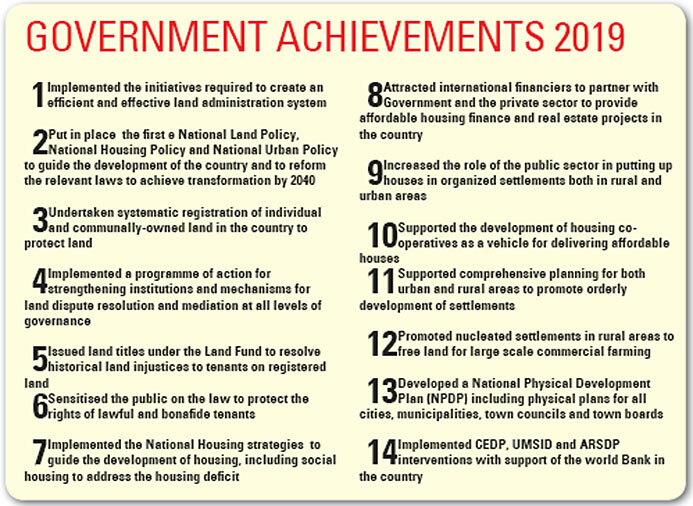NRM delivers on land policies for the poor
Jan 22, 2020
In the NRM manifesto 2016-2021, the President laid out a long list of reforms to improve land administration and protect interests of both land owners and tenants.

PHOTO: Land probe chairperson Justice Catherine Bamugemereire (third-right) with officials from National Forest Authority and the land inquiry during a field visit at Bajjo central forest reserve in Kayunga district in May. NFA accuses land grabbers of acquiring land in the area for personal use
When President Yoweri Museveni took to the campaign trail during the last general elections, he had a message of hope for voters regarding the complex issues regarding land ownership and use.
In the NRM manifesto 2016-2021, the President laid out a long list of reforms to improve land administration and protect interests of both land owners and tenants.
This is in addition to other key reforms at the time, including the Land Amendment Act, 2010, which offers protection of tenants (bibanja holders) from evictions by land grabbers.
Land units established
The Government had already established land units in the Police and the Offi ce of the President to support handling of land issues.
At least 13 regional land offi ces had already been completed in Wakiso, Mbarara, Masaka, Jinja, Mbale, Arua, Masindi, Mukono, Fort Portal, Lira, Gulu and Kibaale. A records and archival centre was already in place in Entebbe and a National Land Information Centre in Kampala established to support access to public information about land.
In Kampala city, Mukono, Masaka, Jinja, Wakiso and Mbarara, six regional lands offi ces had already been equipped to handle land matters.With the Land Fund set up to enable bonafi de occupants to acquire full ownership rights through acquisition of land titles, government committed to secure land ownership for the less privileged.
President's pledge
Museveni promised to implement the additional initiatives to create an effi cient and effective land administration system.

Gertrude Nakimbugwe, a witness in a land grabbing matter, appears before the Commission of Inquiry into land matters
He also pledged to implement the National Land Policy, reform the relevant supporting laws and undertake systematic registration of individual and communally-owned land.Museveni also pledged to strengthen institutions and mechanisms for land dispute resolution and mediation at the local government level and protect the rights of lawful and bonafi de tenants.
Progress made
The minister of lands, housing and urban development, Betty Amongi says government has scored on land registration and titling.
"We have worked hard on computerisation of the land registry and making sure that land titles are more secure," she explains.
Through the digital archive based at the ministry's head offi ces in Kampala, people with land queries can verify ownership since it provides real-time information on all surveyed land. In addition to the computerised registry, at least 21 districts are now capable of handling land registration, following the creation of seven lands zonal offices countrywide.
The new zonal lands offices are in Mpigi, Luweero, Mityana, Kabale, Tororo, Moroto and Soroti.
Individuals in the districts no longer need to travel to Kampala for the services.
They complement already existing 14 zonal offi \ces in Kampala, Wakiso, Masindi, Mukono, Kibaale, Kabarole, Mbarara, Arua, Gulu, Lira, Mbale, Rukungiri and Jinja.
Land evictions tamed
During the last presidential campaigns, Museveni repeatedly warned against the eviction of bonafide land tenants or bibanja holders and assured them of government protection.
Last year, over 300 bibanja holders from three villages in Nakaseke district received mailo land titles for land measuring two square miles.

According to Amongi, government has taken steps to tame unlawful land evictions of tenants, or squatters, by helping them to acquire certificates of occupancy."Under mailo land tenure system, where bibanja holders are vulnerable, we have helped them to acquire certifi cates of occupancy.
Land evictions have now reduced substantially," she explains.Over 20,000 certifi cates of customary land ownership have been issued to benefi ciaries in Pader, Nwoya, Kasese, Kabale and Adjumani, according to the ministry's 2018/19 performance report.
In addition, over 1,000 communal land associations have been registered in Karamoja, Bunyoro, Bukedi regions and Kayunga district.
The lands ministry is also carrying out systematic demarcation in several districts for issuance of land titles to lawful and bonafi de occupants.
Through the land fund, the government has purchased 4,022.91 hectares (10,057 acres) from absentee landlords in Bunyoro, Buganda, Ankole and Toro.
As a result of the scheme, about 5,000 households of occupants have been spared from eviction from the land acquired by government, according to the ministry's report.
Through the Systematic Land Adjudication and Certification programme, government is aiding registration of communal and individually owned land.Under the programme, over 75,000 parcels of land will be titled in the districts of Ibanda, Mbarara, Kiruhura and Oyam district.
The programme targets to demarcate and register individual lands in rural and peri-urban areas (including issuance of titles to said individuals).
New statutory instrument
Amongi says a new statutory instrument has been issued specifying how much tenants are required to pay to landlords as ground rent, without which a tenant can be evicted.
She also discloses that a new statutory instrument is being fi \nanlised with provisions for places where a tenant can pay their ground rent if the landlords declines to receive it.
"You can now be able to deposit it with the offi ce of the sub-county chief or designated office which will be clearly indicated," Amongi explains.
Government also plans to capitalise Housing Finance Bank and the National Housing and Construction Corporation to provide decent, affordable housing, especially in the urban areas.
